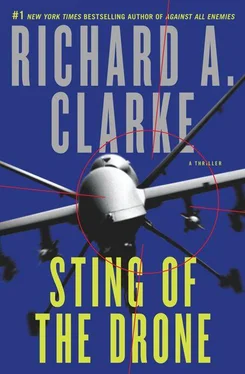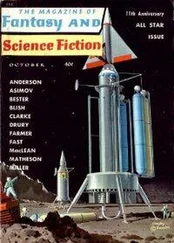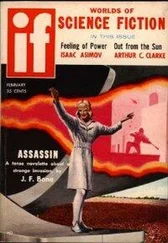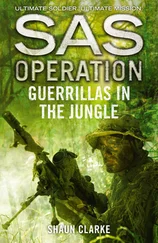“Congressman, our review indicates that there was a tunnel leading out from the compound,” Ray began. “That tunnel was undoubtedly used by the terrorists to smuggle the children in without our seeing them and to permit the terrorists to leave without being detected. We discovered that tunnel after the attack using one of the few drones we have with a multispectral camera and ground-penetrating radar. It was not flyable when the attack occurred. Our requests for funding for such UAVs were severely reduced.”
The Chair interrupted. “Mr. Bowman, do not attempt to blame the failure of the program to do its due diligence on this target on some funding decision that the Congress made.”
Ray regretted his response, but did not reveal it. “Congresswoman, if I may, we believe that this heinous, despicable act by the terrorists demonstrates both the depths to which they will go to discredit the UAV program and, therefore, how much they fear the program, how effective it is against them.”
Congressman O’Connell tapped his microphone to resume his questioning. “It’s effective, all right. Effective in alienating the very population we have been trying to influence, trying to turn away from terrorists. Your attack on the orphanage caused days of mass street demonstrations and protests in Afghanistan, Tajikistan, and Pakistan, attempts to storm our diplomatic missions, probably led to some of the suicide bomber attacks and roadside bombs that have killed our troops. This is what happens when you are not on the scene, when you are observing from thousands of miles away.”
Sandra felt a need to respond welling up inside her. She was there to provide Ray with technical details, but she thought she was coming under personal attack. “Congressman, no unit of Special Forces hiding up in the hills nearby and helicoptering in to raid that compound could have seen better than the UAVs. From above, we had a complete view of the compound that no one on the ground could have achieved. We were able to follow two separate targets as they drove to the compound. We confirmed through High Definition Imagery and Facial Recognition Software that both men were on the HVI list approved by senior level policy, intelligence, and legal officials from six departments and agencies. They were there.”
“Not when you fired missiles at that compound,” O’Connell shot back, almost screaming into the microphone. “Not when you murdered those boys.”
“Congressman, we learned a lesson from that attack,” Sandra replied, her face reddening. “We knew there was always a risk that the targets might escape through tunnels. We were willing to accept that. It did not occur to us that they would kidnap children and sneak them into a compound and then lure us to attack it. Maybe our minds were just not perverted enough to think of that. All of us involved in the program deeply regret the deaths of those innocent kids, but while it may have been our missiles that killed them, it was the terrorists who were the murderers, not us. If you want to yell at murderers, I think you are going to have to go to Afghanistan.”
The hearing room fell silent. O’Connell pushed away from the dais and leaned back in his chair glaring down at Vittonelli. “The Chair calls upon the Ranking Minority member, Mr. Scott of Virginia,” Levinson said.
“We are all, of course, in agreement that we have to deal with these terrorists,” Congressman Scott began. “But I think we are all a little concerned that this new technology may have made it just a little too easy to kill. So easy that you have stopped trying to apprehend them and put them on trial. And when you capture terrorists, you can collect all sorts of useful documents, as we saw with the raid on bin Laden’s house. And you can get them to talk, as we saw with the advanced interrogation techniques used on Khalid Sheik Mohammad, the mastermind of 9/11.”
Ray looked at Sandra, like a baseball player indicating that this was his ball to catch. “Congressman Scott, we have not abandoned arresting terrorists. Certainly in this country or any cooperating country which has control of its territory, we prefer to do arrests. But there are nations who will not cooperate and there are nations who would, but they do not control all of their own territory sufficiently to give us an environment in which it would be safe to try to perform arrests without placing an American arrest team at unacceptable risk.”
Congressman Scott looked unconvinced. “Well, I just can’t remember the last time when the United States actually staged an arrest raid to get a big terrorist target. See the thing is, when you say that it’s too risky, the result is that you have decided to implement the death penalty instead. And you do that without any kind of trial, any kind of defense, any kind of transparent, public process. It’s just the kind of government activity that the Founding Fathers, many of them from my state, opposed and tried to prevent through the Constitution. Now I know you two aren’t lawyers and while I am, I am no Constitutional scholar, but this worries me.”
After her last intervention, Sandra looked to Ray for a nod before commenting. She got it. “Well, actually, Congressman, I am a lawyer, graduate of the University of Virginia Law School, as I believe you are.” She waited for that remark to hit home. “But also like you, I do not pretend to be a Constitutional scholar. We do have them, however, in the Justice Department and the White House General Counsel’s office, and they have examined this question in great detail. Their view, which we can provide in writing, is that the Supreme Court has held that killing enemy combatants is not a part of the criminal justice system. On the traditional battlefield, there are no lawyers reviewing things before they happen. In our program, there are.”
The Chairwoman seemed agitated. “Ms. Vittonelli, I think you have put your finger on part of the problem that makes so many of us up here uneasy. For you, the whole world is the battlefield and anyone is an enemy combatant. And as a lawyer, a graduate of Harvard Law, I think that you and the Justice Department have overconstrued the Supreme Court case about the Nazi soldiers in World War II.”
Before she could respond, Congressman O’Connell was waving his hand at the Chair for recognition. “Madam Chairwoman, I think you are exactly on point. They not only can declare anyone an enemy combatant, they have declared American citizens as enemy combatants and killed them without a grand jury, a defense lawyer, a judge, a jury of peers, or an appeal court.”
Ray put his right hand on Sandy’s arm to indicate she should not respond. He did. “Congressman, to the best of our knowledge only four American citizens have been killed by the program and they were self-declared members of al Qaeda. They were engaged in planning the killing of Americans. They had been involved in terrorist attacks that did kill Americans. If we waited to the day when we could arrest them and give them their Miranda rights, there would be more Americans dead now.
“If an American in 1943 moved to Germany and put on the Nazi uniform and fought U.S. troops, no one would think his American citizenship should make him invulnerable to U.S. bombing raids, or that our troops should have tried to separate him out from the Wehrmacht and arrest him during a battle. With Americans who join al Qaeda and then scheme to kill their fellow citizens, they are a threat in being. Our first responsibility is to defend the other Americans they are trying to kill. And the best way to do that under current circumstances is often to use the UAV program. If we did otherwise, this Committee would, rightly, be criticizing us for not doing enough to protect Americans from terrorists.”
Sandra was wondering if there were any Members on the committee who supported the program. If there were, they were being quiet, or absent. The Chair resumed her questioning. “This battlefield you keep referring to, Mr. Bowman, where is it? What countries are you operating in today? How many aircraft do you fly a day?”
Читать дальше












